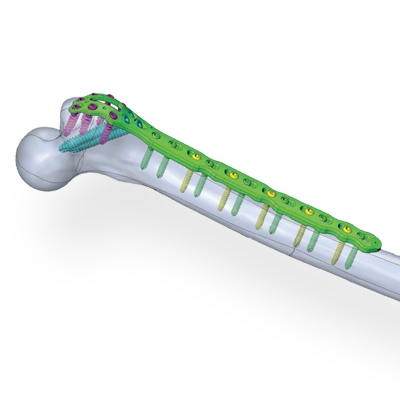
Upper end of femur; It is the bone structure that includes the femoral head, neck and 5 cm distal to the lesser trochanter. Subtrochanteric femur fractures account for 7% to 20% of femoral fractures. It is caused by high-energy trauma at a young age and by a simple fall at an advanced age. Trochanteric fractures account for 55% of femoral upper-end fractures and are mostly seen in elderly, osteoporotic patients. Locking anatomical plates are designed for proximal femur fractures as an alternative to existing fixation methods for both trochanteric and subtrochanteric region fractures.
-Fracture repairs in the metaphyseal and diaphyseal areas of the clavicle,
-Proximal humerus fractures, osteotomies and nonunions,
-Humeral diaphyseal fractures and fractures in the meraphyseal region of the humerus,
-Intraarticular and supracondylar fractures of the distal humerus,
- In the surgical treatment of olecranon fractures,
-In fractures of Ulna-Radius bones,
For fractures and corrective osteotomies of the carpal and metacarpal region associated with the distal radius,
- In posttraumatic cases of wrist joint, wrist deformities requiring correction operation, fractures of carpals, metacarpals and phalanges,
-Simple and reverse intertrochanteric fractures,
- In the surgical treatment of metaphyseal fractures of the tibia region,
- In the treatment of distal femur shaft fractures, intra-articular fractures, femoral intertrochanteric region fractures
- In calcaneus comminuted fractures,
- In case of poor union and lack of union,
-Fractures of the pelvis region,
-Clavicle region fractures,
-Plates and screws are used in tarsal, metatarsal, phalanx and calcaneus fractures and treatments.
MINIMALLY INVASIVE LOCKED PROXIMAL FEMUR PLATES
- Diameter 5.0 mm
- Width 18 mm
- Hole Type Combihole
- Material Titanyum Gr5 Eli ( Tı6al4v Elı )